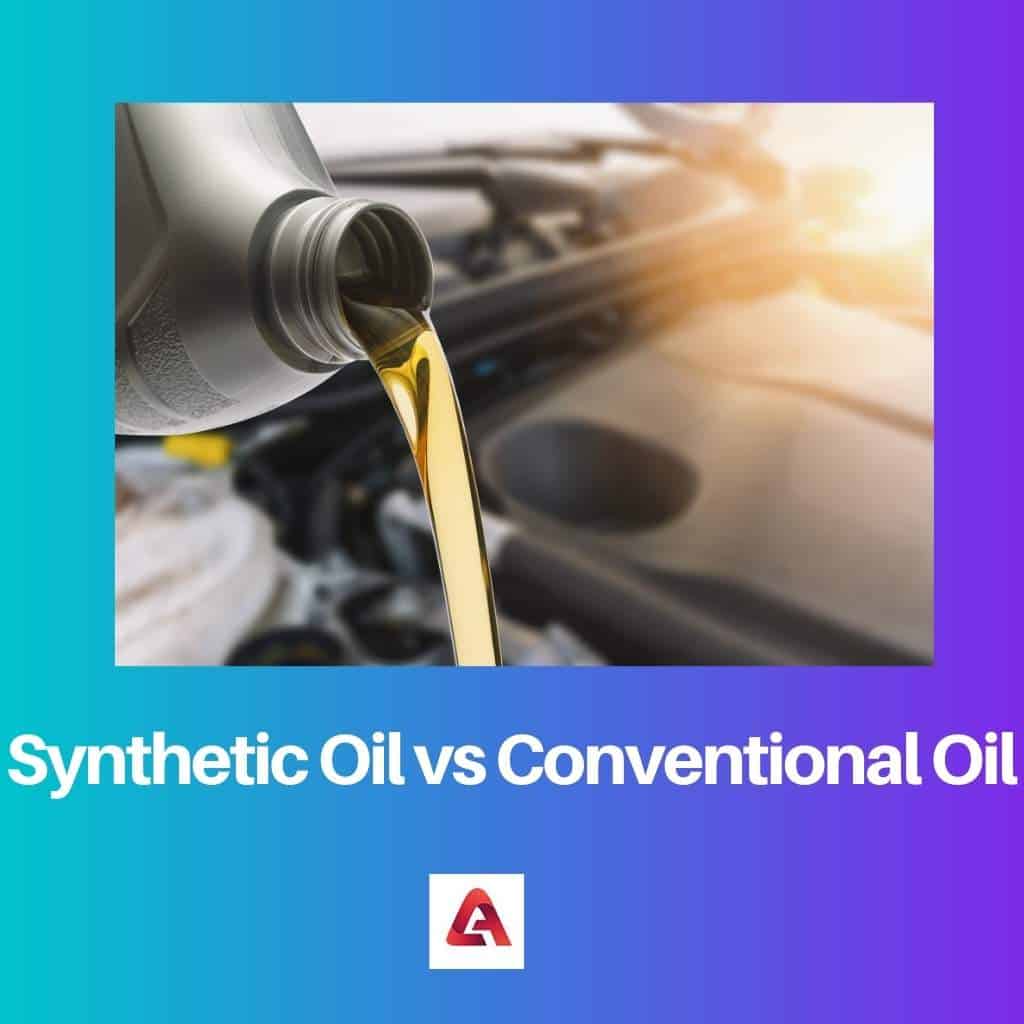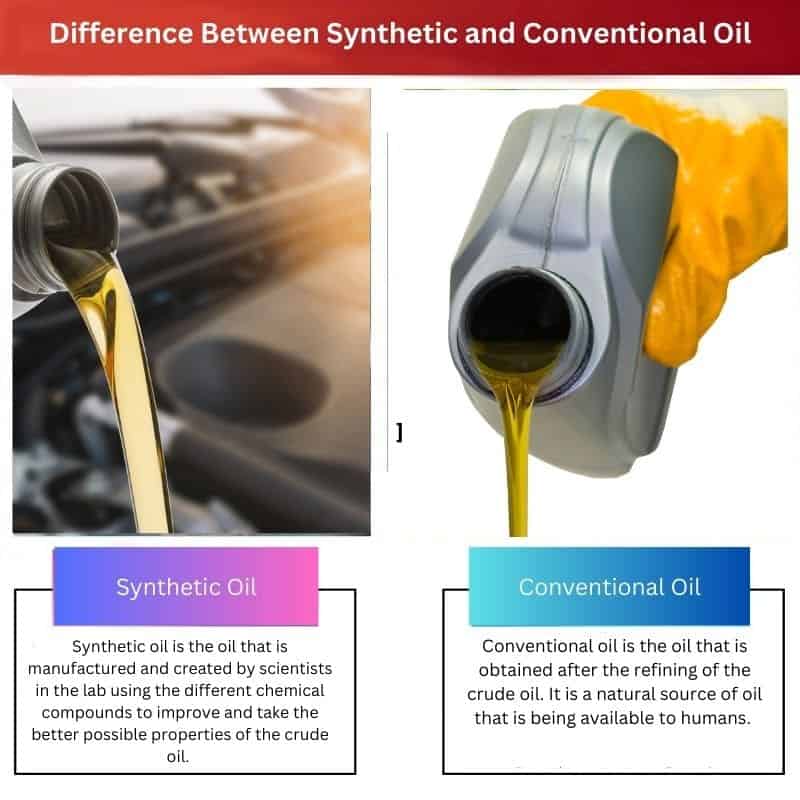Vehicles require the correct and worthy oil for their engine which makes it last longer. Most vehicles are recommended to use synthetic oil. With improvised models of the vehicles they are automatically made to equip with synthetic motor oil.
The engine motor oil is the food for the vehicle that protects it from breaking down.
Key Takeaways
- Synthetic oil is chemically engineered from base oils and additives, while conventional oil is derived directly from crude oil.
- Synthetic oil offers superior performance, such as better temperature resistance and longer-lasting protection, compared to conventional oil.
- Although synthetic oil is more expensive than conventional oil, it requires less frequent oil changes, potentially saving money in the long run.
Synthetic Oil vs Conventional Oil
The difference between Synthetic Oil and Conventional Oil is that Synthetic Oil is manufactured by scientists with different chemical compounds to extract the best possible properties of crude oil. It has a very high viscosity and can flow in the extreme temperatures of the vehicle. Whereas comparatively on the other hand, Conventional oil is oil that has been refined from crude oil, and conventional oil is not able to flow at extreme temperatures.

Synthetic Oil is the oil manufactured by the scientist to drive the best possible properties of conventional oil. As the oil is artificial, therefore they have the least impurities in the oil.
The cost of engine motor oil is costly, but it has high lubrication and high viscosity. Also, the less impurity in the oil makes it resistant to sludge formation.
Conventional Oil is the oil that is obtained after refining the crude oil. As it is obtained from crude oil, it has many impurities in it, and it is the major reason for the formation of sludge in conventional oil. It also provides less protection to the engine, which decreases the life of the vehicle engine.
Comparison Table
| Parameters of Comparison | Synthetic Oil | Conventional Oil |
|---|---|---|
| What is it? | Artificial | Crude oil |
| Impurities | Less | More |
| Engine Wear Protection | It gives more protection and extends the life of the engine | Less protection |
| Oil Change Intervals | Longer oil intervals | Small oil change intervals |
| Flow at High Temperature | Better flowing capacity at temperatures like 200° and above | Less flowing capacity at high temperature |
| Sludge Formation | Fewer impurities make resistance to sludge formation | More impurities make it more prone to sludge formation |
| Price | Costly | Cheaper |
What is Synthetic Oil?
Synthetic oil is the oil that is manufactured and created by scientists in the lab using different chemical compounds to improve and take the better possible properties of the crude oil.
As the oil is prepared in the lab by the scientists with a uniform molecule structure, thus it is assumed to have fewer impurities in it. Even though a Japanese motor company Subaru recommended using the oil in all of its models by the year 2020.
The oil contains fewer impurities in its structure which makes it quite good resistant oil to form sludge quickly. They slow down the sludge-forming process.
Also, it doesn’t require to be changed after every 3000 miles as it has many durable properties which allow the oil to last long and shorten the oil change intervals.
The viscosity of the synthetic oils is very high, which allows them to be in flowing nature even in extreme weather conditions. The price of synthetic oil is quite high because of its many durable properties and fewer impurities.

What is Conventional Oil?
Conventional oil is the oil that is obtained after the refining of crude oil. It is a natural source of oil that is available to humans. One of the disadvantages of conventional oil being a natural source is that it contains many impurities.
As a result of which, conventional oil is quite prone to early sludge formation.
The impurity in the molecular structure makes the conventional oil-less suitable for longer use. For conventional oil, the oil interval change is after the use of a vehicle about every 2500-3000 miles.
Nowadays, conventional oil is mixed with many other constituents, and they are – detergents, additives, and viscosity modifiers.
The viscosity of conventional oil is low, which makes it difficult for the oil to withstand extreme temperature conditions and retain its original flowing capacity. The price of the oil is quite low.

Main Differences Between Synthetic and Conventional Oil
- Synthetic oil is manufactured by man; hence it is known as man-made motor oil, whereas comparatively, on the other hand, the conventional oil is obtained after refining the crude oil; hence it is known as crude oil.
- Synthetic oil is prepared from various chemical compounds; thus, it has fewer impurities in motor oil, whereas comparatively, on the other hand, conventional oil is obtained from crude oil and thus contains many impurities.
- Synthetic oil is the best-suited motor oil for the protection of the vehicle engine as it extends the life form, whereas, comparatively, on the other hand, the conventional oil is less suited for the engine and does not extend the life of the engine.
- Synthetic oil takes quite long time intervals for the replacement in the motor vehicle, whereas comparatively, on the other hand, conventional oil is replaced frequently in the motor vehicle.
- In winter, the vehicle engine takes longer to heat up, and thus synthetic oil still remains in its flowing nature even at the temperature of 200° and above, which makes it a suitable motor oil, whereas comparatively, on the other hand, the conventional oil cannot retain its flowing nature at such extreme temperature.
- Synthetic oil has fewer impurities in its composition and thus is resistant to sludge formation and breaking down the engine, whereas comparatively, on the other hand, conventional oil has more impurities and thus is more prone to sludge formation.
- Synthetic oil is much costlier, whereas comparatively, on the other hand, conventional oil is cheaper.

The scientific insights and comparisons provided in the article are beneficial for making informed choices regarding the selection of motor oil for vehicles.
The analysis of synthetic and conventional oil’s molecular structures and their implications for engine performance is particularly enlightening.
I appreciate the meticulous examination of the flow capacities, impurity levels, and cost differences between synthetic and conventional oil.
The detailed explanations regarding the manufacturing processes, impurity levels, and viscosity differences of synthetic and conventional oil are enlightening.
I appreciate the scientific insight provided, establishing the reasons behind the differences in performance and longevity of the two oils.
The thorough analysis of the molecular structures and sludge formations in both types of oil sheds light on their advantages and drawbacks.
The detailed descriptions of synthetic and conventional oil, along with their respective benefits and drawbacks, offer a comprehensive understanding of the topic.
The explanations regarding the flow capacity at high temperatures and the impact on engine wear protection make the article incredibly informative.
I find the comparison of oil change intervals and the resistance to sludge formation particularly informative for maintaining the performance of my vehicle.
The detailed examination of synthetic and conventional oil’s chemical composition and their effects on engine protection provides valuable insights for vehicle owners.
The article’s emphasis on the viscosity differences and the implications for engine wear protection is commendable, enhancing our understanding of motor oil choices.
The article presents a comprehensive overview of synthetic and conventional oil, further enhancing readers’ understanding of their characteristics and properties.
The article effectively highlights the key contrasts between synthetic and conventional oil, aiding readers in making informed decisions for their vehicles.
The comparison of the price and long-term benefits of synthetic oil versus conventional oil is valuable for consumers looking to optimize engine performance.
The article provides a detailed explanation of the differences between synthetic and conventional oil, including their manufacturing processes and chemical properties.
I agree, the information provided is comprehensive and well-researched.
The distinction between synthetic and conventional oil, as well as their respective advantages and disadvantages, is elucidated excellently in the article.
The article emphasizes the importance of understanding the chemical properties and behaviors of different oils to make informed decisions for vehicle maintenance.
The in-depth analysis of the cost, impurity levels, and sludge formation tendencies of synthetic and conventional oil provides valuable insights for consumers.
The article offers a thorough and educational exploration of synthetic and conventional oil, making it easier for readers to comprehend the complex differences between the two types of oil.
The comparison table is very helpful in understanding the key differences between synthetic and conventional oil in terms of engine wear protection, oil change intervals, and more.
The cost comparison is particularly useful for decision-making purposes, especially considering the long-term savings potential with synthetic oil.
Absolutely, the table simplifies the complex differences between the two types of oil and makes it easier to comprehend.